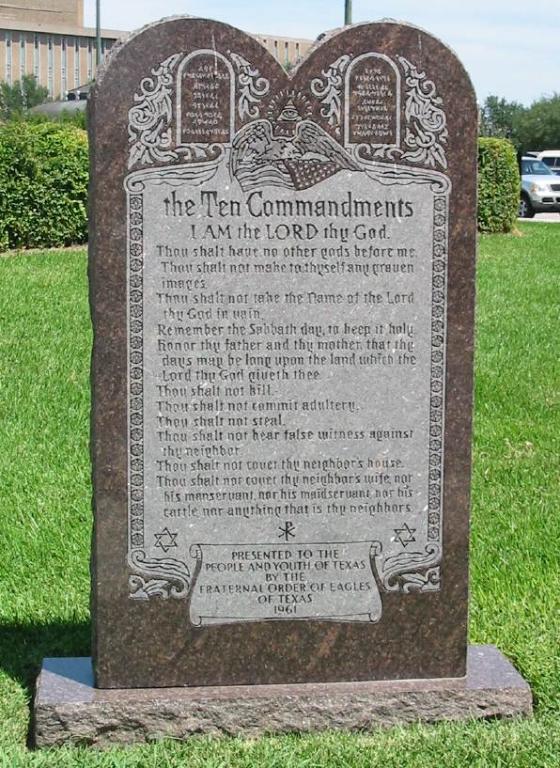“He said during a committee hearing earlier this month that the Ten Commandments are part of American heritage and it’s time to bring them back into the classroom. He said the U.S. Supreme Court cleared the way for his bill after it sided with Joe Kennedy, a high school football coach in Washington state who was fired for praying at football games.”
He who? Who he? What’s happening and where?
Let me start over — at the beginning this time instead of in the middle, “Public schools would have to display Ten Commandments under bill passed by Texas Senate“:
Public schools in Texas would have to prominently display the Ten Commandments in every classroom starting next school year under a bill the Texas Senate approved Thursday.
Senate Bill 1515 by Sen. Phil King, R-Weatherford, now heads to the House for consideration.
King said during a committee hearing earlier this month that the Ten Commandments are part of American heritage and it’s time to bring them back into the classroom. He said the U.S. Supreme Court cleared the way for his bill after it sided with Joe Kennedy, a high school football coach in Washington state who was fired for praying at football games.
That’s how a news report has to begin –with a full reference right off the bat to identify who it is we’re talking about. Otherwise we’re failing to address the basics that every reader needs to know: Who? What? When? Where? etc.

We can’t just start off talking about “He” without providing a specific antecedent for that pronoun. “He” could be any one of four billion guys. And it won’t do to just say “King” or “Phil” or even “Phil King,” either. There are a lot of guys named “Phil” or “King” or even “Phil King.” If we don’t say which specific “Phil King” we’re talking about then we have no way of understanding the rest of what’s being said. So on first reference we have to spell that out, specifically — “Texas state Sen. Phil King, R-Weatherford” — or else the rest of this won’t make any sense.
That’s the problem with the “Ten Commandments” monument sitting just outside of the Texas capital where state Sen. Phil King and a majority of his Republican colleagues passed this bill. The monument starts off with an undefined pronoun and neglects to ever provide an antecedent.
Worse than that, this monument edits and alters the scripture it’s citing (invisibly, without elipses) to get rid of the clarifying identification that would let readers understand who it is that this “I” speaking might be. For all we know, the one saying “I am the Lord thy God” might just be some guy named Phil. Or, maybe, some other guy named Phil.
It very deliberately doesn’t say who “I” is, so one guess is as good as any other.
Readers already familiar with the Ten Commandments may be aware that the text of this monument is adapted from an English translation of Exodus 20:2-17. But not all of those readers will recognize that the monument cuts out most of Exodus 20:2.
The bit that got cut here is rather important because, again, it’s the only place in this text that identifies who it is that is speaking. That matters a great deal and leaving that out makes what follows impossible to follow. “Thou shalt have no other gods before me” is a commandment that can only be heeded if you know which God is speaking. Thor? Baal? Vulcan? Eris? There are a lot of Gods this might refer to — more gods than there are guys named “Phil,” probably. And we can’t make sense of any of this unless we know, specifically, which of Them is speaking.
That identification can be found, fortunately, in the parts of Exodus 20:2 that the monument makers chose to leave out. Here’s the full verse, in that same 400-year-old English translation: “I am the Lord thy God, which have brought thee out of the land of Egypt, out of the house of bondage.”
Aha! OK, then, now we know which God is speaking. It’s not just any God, it’s the God who “brought thee out of the land of Egypt, out of the house of bondage.” Or, as most other English translations put it, the God “who brought you out of the land of slavery.”
That’s the God referenced in every other sentence on this monument, that God and no other god: the God of liberation from slavery.
This is the problem with this monument and with the edited version of the “Ten Commandments” that many of us were taught to memorize in Sunday school. That edited version treats “Thou shalt have no other gods before me” as the first commandment, leaving us to guess or to assume or to presume that we already know which God is talking here.*
That’s a dangerous assumption here in the context of the Ten Commandments, in which this God — the God who brought you out of slavery — emphasizes that misidentifying this God is a deadly serious matter. Misidentify this God, this God says, and you’ll get smacked so hard your grandchildren and great-grandchildren are gonna feel it.
This is why I prefer the Jewish/Talmudic version of the Ten Commandments, which seems wiser and better than most of the Christianized revisions of the original. In the Jewish version, “I am the Lord your God, who brought you out of Egypt, out of the land of slavery” is listed as the First Commandment. That seems necessary to me, both as a matter of theology and as a matter of copy editing. Full identification on first reference is the only sure way to avoid a host of errors.
Some of the other variations of the Ten Commandments also at least incorporate this identification into what they number as the First Commandment. Many Reformed Christian churches use a version of the Ten Commandments, following John Calvin, that rolls “I am the Lord your God who brought you out of slavery” and “Thou shalt have no other gods” into a single First Commandment. (This is also the version in the Book of Common Prayer used by Anglicans.) The official Roman Catholic version of the Ten Commandments does this too, following Aquinas rather than Augustine, whose version left out Exodus 20:2 entirely.
The Lutherans, as usual, follow Augustine there — also refusing to tell us which God is speaking here. The Lutherans also do this weird thing at the end of the list, breaking the single commandment against coveting into two parts, thus making “Thou shalt not covet thy neighbor’s house” the Ninth Commandment and “Thou shalt not covet thy neighbor’s wife, nor his slaves,** nor his animals, nor anything of thy neighbor” the Tenth Commandment. That seems arbitrary and strange — like a desperate attempt to wind up with Ten Commandments instead of only nine. But it’s not as strange as what the Roman Catholic version does, scrambling the order of Exodus 20:17 to make “Thou shalt not covet thy neighbor’s wife” the Ninth Commandment and “Thou shalt not covet thy neighbor’s house … nor his slaves, nor his animals, nor anything of thy neighbor” the Tenth.
White evangelical Protestants tend to use an Americanized version that numbers the commandments the same way as the Reformed/Anglican list, but — like the Lutherans — demotes Exodus 20:2 to a kind of optional preface not considered part of the actual Ten Commandments. On the rare occasions this preface is included, it’s almost always shortened as it is there on the Texas monument, eliminating the clarifying identification of “the God who brought you out of slavery.”
That makes sense, if you think about it. You can’t very well have a monument that says “I am the Lord your God, who brought you out of Egypt, out of the land of slavery” in a city founded by and named after Stephen F. Austin. Duh.
I’m not sure how our various Eastern Orthodox cousins enumerate the Ten Commandments or what versions might be preferred or employed by our Coptic kin, or by Nestorians or any of the other Christian traditions I’m less familiar with. Islam also has its own, quite different, “Ten Commandments.” (And I won’t even mention the Eight I’d Really Rather You Didn’ts of the Pastafarians.***)
But the point here is that there is one undeniable fact about all of these various sectarian versions of the Ten Commandments. That undeniable fact is, of course, that there are various sectarian versions of the Ten Commandments.
Which of these versions is the Official Texas Version that Phil King’s law will require be prominently displayed in every public school classroom?
Texas has to pick one and, therefore, Texas has to reject all of the others.That choice is intrinsically, pervasively sectarian. That choice is unavoidable and that choice is unavoidably establishmentarian.
Sen. King and his white Christian nationalist Republican colleagues in the Texas Senate do not seem to realize this. I’d guess — one has to guess, because neither the proposed law nor the lawmakers has said — that King is thinking of the white evangelical variation that appears on the Texas monument. Posting that version of the Ten Commandments on the wall of every classroom in every public school in Texas does not so much teach students that Texas thinks murder and theft and weekends are wrong as it teaches students that Jews, Catholics, Lutherans, Anglicans, Calvinists, Muslims, Hindus, atheists, and Sikhs are wrong.
It teaches that Texas students are or ought to be generic, slavery-eliding white evangelicals and that they ought not to be Jewish or Catholic or Lutheran or Reformed or Anglican or Muslim or atheist.
It’s also possible that Sen. King and his Republican colleagues do realize this and that this is what they intend to do and to teach and to establish with this legislation.
Someone should ask them if that is the case.
* You may have noticed — or “thou” may have noticed — that there’s another undefined, no-antecedent pronoun lurking in this Texas-version Ten Commandments monument. Just as the monument cuts out the part of Exodus 20 that tells us who “I” represents, so to the monument is mum on who it might be that “thou” refers to.
That’s a bit more complicated. We have to go back one chapter to clarify which “thou” or “you” it is that the God who brought you out of slavery is addressing here. Exodus 19:3 supplies that antecedent. “You” here refers to “the house of Jacob … the children of Israel.”
So how is it that a bunch of non-Israelite Gentiles like, say, me and Texas state Sen. Phil King (R-Weatherford) have chosen to graft ourselves into that “Thou”? Well, that’s a much longer story, the answer to which involves a lot of theology found in and/or layered on top of much of the New Testament.
** [Record scratch] Hold up, “thy neighbor’s slaves”? Didn’t we just finish saying that it’s blasphemous disobedience to say we’re following any other God than the God of liberation from slavery? WTAF? They couldn’t even keep that up for another 20 verses? What’s going on here?
Here, again, the answers are long and complicated. Some involve a kind of apology for this apparent contradiction that appeals to the ways that Mosaic laws governing slave-keeping were far more humane than the laws governing slavery in other ancient societies. Others involve notions of a trajectory of revelation progressing toward the later statements from the prophets condemning all slavery without qualification. Still others flout the implicit warning of God’s preferred title and identity there in Exodus 20:2 and glibly make a Wilhoitian appeal to some presumed hierarchy, thereby seeing nothing amiss with “liberation for me, slavery for thee.”
I’m mostly a trajectory of revelation guy, but I’d also point out another huge, unmissable theme in the chapters of Exodus that give us the Ten Commandments and the stories around their revelation: People suck. Tell us to consecrate ourselves to hear the word of the Lord and we’ll melt down all our gold into an idol to worship instead. The laws of Moses often seem formulated to take that into account. Here are a bunch of laws that, if followed, will ensure the complete eradication of poverty among you. And, OK, given how much people suck and how depressingly obvious it is that you’re not gonna follow those rules abolishing poverty, here are a bunch more laws compelling you to be generous to the poor people among you. That kind of thing.
I’d also point out that the reference in Exodus 20:17 to thy neighbor’s slaves is — like the reference to thy neighbor’s house — a howling anachronism in a Moses story set in the wilderness of Sinai. Nobody’s got a house in this story. Even God is, at this point, still living in a tent. The houses and slaves show up here for the same reason that domesticated camels do — because this story was written many centuries later by people who couldn’t imagine that past without projecting back into it everything they had, such as houses, slaves, and camels.
The evidence, I think, strongly suggests that most of these stories about the reception of the laws of Moses — including the laws themselves — were written much later than the supposedly “later” prophetic writings that expand or reinterpret them. That complicates this notion of a trajectory of revelation. Whatever that trajectory might involve, it cannot be chronologically linear.
*** King has cited the 2022 decision in Kennedy v. Bremerton as evidence that the Harlan Crow Court is open to wholly reinterpreting legal precedent and the black-letter law of the Establishment Clause. That’s not wrong, but I’d remind him that this same Supreme Court also produced the Hobby Lobby ruling. That chaos-inviting decision holds that religious views need not be demonstrably sincere, or part of any pre-existing religious tradition, or even tethered to anything like reality as we know it in order for those views to exempt those who assert them from any law they claim would be in conflict with them.
The confused and confusing logic of Hobby Lobby means that we’re not just dealing with a half-dozen extant sectarian variations of the Ten Commandments, but also with any and every potential variation that some person and/or corporation might choose to invent and to assert as their belief.













